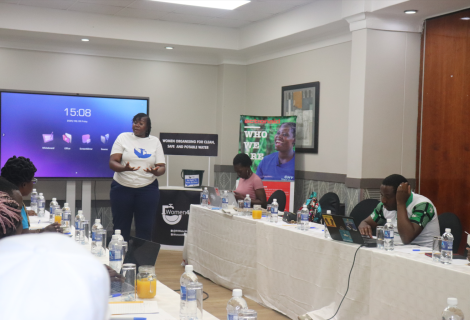Water Justice Stakeholder Dialogue: A Collective Call for Action

On September 26, 2025, a pivotal Water Justice Dialogue took place in Harare, convened by ActionAid Zimbabwe, Women for Water movement and Sprout Women for Empowerment in response to Zimbabwe's escalating urban water crisis. This gathering aimed to unify various stakeholders in a concerted advocacy effort, addressing the urgent needs of communities disproportionately affected by water scarcity. The dialogue sought to break away from fragmented approaches and build a collective advocacy front, emphasizing the importance of community voices in high-level policy discussions.
The dialogue was rooted in the harsh realities faced by women and girls in high-density areas like Chitungwiza, Hopley, and Epworth. These communities endure daily struggles for water access, often facing health hazards and gender-based violence. As women shared their experiences, it became clear that the burden of unpaid care work severely limits their opportunities for economic activity and personal well-being. Powerful testimonies revealed a dire situation, with women describing the long distances they must walk for water, the exploitation they encounter at water points, and the public health risks posed by living in environments contaminated with sewage. Many reported collecting water from graveyards, illustrating the urgency of the crisis as they face the looming threat of waterborne diseases.
The dialogue was enriched by the voices of community champions who articulated the lived realities of those suffering from the water crisis. These women highlighted not only the physical challenges they face but also the emotional toll of constant insecurity and fear. Their stories painted a vivid picture of a crisis that extends beyond mere access to water; it intertwines with issues of governance, gender-based violence, and economic instability.
Wellington Madumira, National Coordinator of Climate Action Network Zimbabwe (CANZIM) noted the urgency.
Communities in Chitungwiza, Hopley, Epworth and other areas are not just facing water shortages. They are being denied their constitutional right to safe, clean and potable water and for that, the State must take reasonable legislative and other measures within its means. It is unacceptable that some households are getting only two or three twenty-litre buckets a day, while water quality deteriorates.
Gladys Chihozhwa, a young woman from Hopley spoke of water desperation.
We used to rely on the municipal supply. Now, we have resorted even to drawing water near graveyards when graves are freshly dug, - because that’s sometimes the only source. It’s shameful, but what choice do we have?.
Caroline Mutimbanyoka, the leader of the women4water movement, stressed the need for solidarity among organisations.
We have been working around water advocacy, but in fragmentation. What we saw today is that this challenge is beyond local councils. - it’s a national crisis. Indeed, a global problem. We must combine forces to ensure that our voice becomes stronger as we seek solutions and accountability around the water crisis, she said.
In breakout sessions, stakeholders engaged in meaningful discussions aimed at moving from problem identification to solution synthesis. Participants shared grassroots initiatives and civil society efforts, revealing a landscape of resilience despite challenges. Community members reported successful mobilization for cluster borehole drilling, demonstrating a commitment to self-sufficiency in the face of systemic neglect. However, discussions also highlighted significant barriers, including the politicization of water access and rampant corruption. Participants recognized that these governance failures hindered progress and perpetuated the crisis, with environmental degradation and the persistent exploitation of women at water points underscoring the multifaceted nature of the issue.
The plenary session culminated in the creation of a unified advocacy framework, empowering the Women for Water movement to take a leading role in organizing diverse stakeholders into a cohesive coalition. Concrete commitments from various partners solidified this foundation, with each organization pledging specific forms of support. The Fight Inequality Alliance committed to coalition organizing and budget tracking to ensure accountability in water-related expenditures. The Harare Residents Trust offered its expertise to lead community mobilization, while the Youth Empowerment and Transformation Trust pledged to engage youth in advocacy efforts. The Climate Action Network committed to ensuring that water security is included in the Climate Change Bill, and community champions vowed to document and share their experiences to strengthen advocacy.
With a clear mandate established, the coalition set two immediate, time-sensitive strategic priorities. First, they aimed to influence the National Budget Process by mobilizing a strong civil society presence in ongoing budget consultations, advocating for targeted allocations for water infrastructure in underserved settlements. Second, they sought to secure water justice in the Climate Change Bill, engaging proactively with policymakers to ensure that water security and resilience measures are integrated into national climate legislation.
To maintain momentum, the coalition outlined a series of ongoing advocacy strategies. They planned to develop unified messaging through joint position papers and public petitions, targeting multiple levels of engagement from communities to local councils and key ministries. Strategic campaigning would leverage significant dates, such as World Water Day, for high-profile actions and utilize media to sustain public pressure.
The Water Justice Dialogue successfully transformed a shared sense of urgency into a concrete action plan. The Women for Water movement, bolstered by the commitment of its partners, is poised to formalize this alliance and advocate for the fundamental right to water for all. By focusing on immediate goals, the coalition aims to hold duty-bearers accountable and ensure that no one is left behind in the quest for water justice.
As they move forward, the coalition stands united in their mission, ready to navigate the complexities of governance and advocate for the rights of the most vulnerable communities in Zimbabwe. The urgency of their cause resonates deeply as they strive to turn the tide on the water crisis and foster a future where access to clean, safe water is a guaranteed right for all.